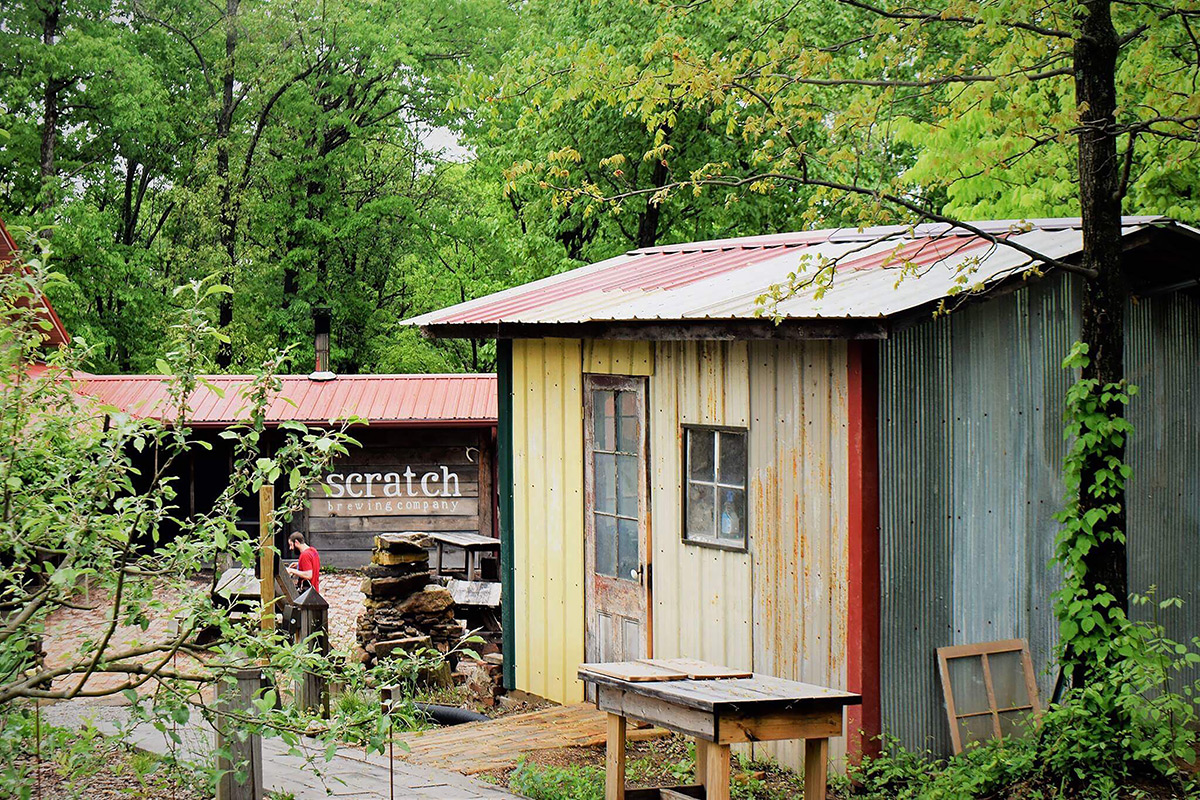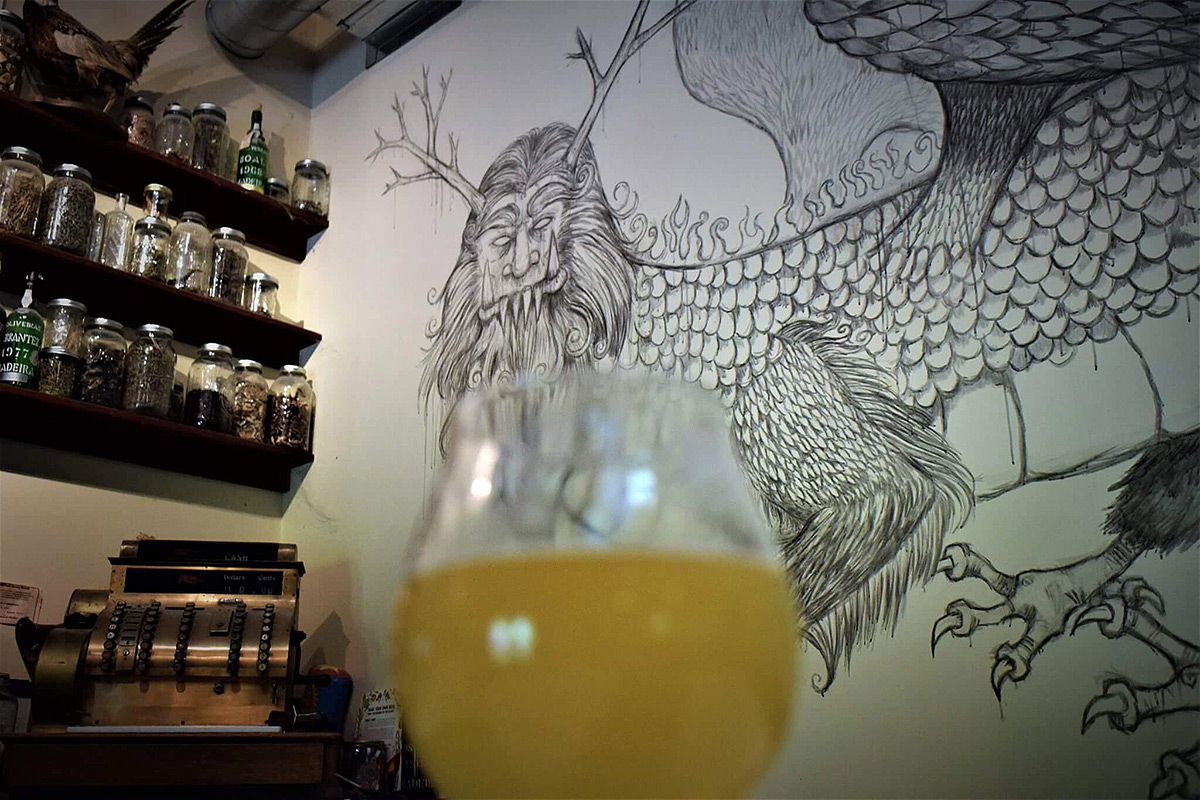Bark to brew: Review of a local brewery with indigenous ingredients
May 6, 2017
A person, whose name is lost to time, said a bartender is a pharmacist with a limited inventory. Whomever this person was obviously never visited Scratch Brewing Company in Ava.
Macrobrew recipes are fairly straightforward: water, hops, malt, wheat and barley. Microbrewers have a bit more of a creative side, adding various fruits, herbs and spices.
However, at Scratch, the recipe book is different.
Advertisement
One might get the impression that the Scratch brewmasters conceived a cookbook that is one part Bear Grylls’s ingenuity and one part Willy Wonka’s pure imagination.
Some goblets or snifters contain a beer made with foraged pine needles, some with housemade smoked rye bread, some with tomatillos; the list of unconventional ingredients goes on and on. So why did Scratch decide to break the mold and create a seemingly neverending supply of avant-garde concoctions?
“Partly, I was becoming more interested in where my food came from,” said Scratch co-owner Marika Josephson.
That interest, combined with a desire to use local ingredients, bled into her interest of homebrewing. Around that same time, Josephson met her business partner and fellow co-owner Aaron Kleidon.
Kleidon, whose family owns the property that Scratch is built on, spent a lot of time in the nearby woods. His knowledge of the local plantlife has been essential to the brews that Scratch has to offer.
Kleidon said the smell of the forest is his inspiration for the beer. There are certain smells, he recalled, that remind him of his childhood. These scents now find their way into the glasses served to a line of thirsty customers. Although the wide variety of ingredients may give one the impression that anything goes, the experimenting process is gradual.
Advertisement*
“We have incorporated different ingredients slowly over the years when something has struck us to try,” Josephson said. “After a year or two, we started using bark for the first time.”
Yes, tree bark. The Wild Cherry Biere de Garde is brewed with bark from a cherry tree that grows behind the brewery.
In fact, most ingredients that go into the different beers at Scratch are foraged from the grounds. This style of brewing sets the Ava business apart from the competition. While there are others that use this style, Scratch has quickly and quietly asserted its status among the top in the genre.
In 2014, Outside Magazine listed Scratch as one of the Top 4 foraged brewers in foraged style. There are brewers that use the style, but none as extensively.
“It’s the heart and soul of what we do,” Josephson said.
It is one thing to use local ingredients or ingredients that were foraged somewhere else, however what Scratch provides is a local, indigenous flavor.
The setting itself is important for the beer, but it also makes for a unique atmosphere. The journey to Scratch is an interesting one.
Off the main road, a narrow two-lane road becomes a tight one-lane road. The tight one-lane road turns into a gravel road that leads into the woods. Just when getting lost in the brush seems a reasonable possibility, a small building appears.
Tucked inside a Bob Ross landscape is a place that All About Beer Magazine lists as one of the most beautiful places in the world to drink.

Visitors find an outdoor drinking area with farm tables and picnic tables complete with rod iron fire pits handcrafted by a local metalsmith. Inside is a small 5-seat bar and few farm tables to create a cozy and intimate environment. Behind the bar are shelves of mason jars filled with the foraged ingredients used in the distinctive concoctions: dandelions, juniper and chanterelle mushrooms to name a few.
Behind the bar is a large, handdrawn mural of the Piasa, the dragon attributed to the Cahokian civilization. Piasa, as with all of the artwork on display at Scratch, was created by local artists.
The very nature of Scratch, the beer and the grounds, complement one another. However, that relationship also dictates what is the brewery offers. There is no flagship beer at Scratch. If one recipe become a hit, it may be awhile before it appears on the menu again, if at all.
“We wanted to be able to just utilize the stuff we had here and it just doesn’t grow all year round,” Josephson said. “It’s better that way because we are getting it locally and it’s more fresh and more flavorful.”
Some beers, like the basil IPA, will be offered on a seasonal basis. Also making a return will be the Chanterelle beire de garde, made from a surplus of chanterelle mushrooms this year.
Like the season, beers at scratch come and go, and with every transition there is opportunity. In this case, a chance to learn more about the local farming conditions.
“It’s important for people to be aware of what’s happening in the seasons, and maybe our beer helps to show that,” Josephson said.
While customers are learning about farming and foraging, Scratch is learning more about beer with the help of SIU’s Fermentation Institute.
“It’s an amazing resource for our region here because there isn’t a lab as extensive as what they’ve set up there,” Josephson said.

Through the Institute, Scratch has been able to precisely measure the alcohol and carbon dioxide levels to gain a better understanding of the process, which translates into a better product.
“Recently, we did a research study with the Institute on our wild sourdough culture that we use to ferment a lot of our beer with to study what happens when you add hops to a mixed culture and how it affects the bacterial growth,” Josephson said.
Learning more about a product is just one thing that excites Josephson about the Institute. Another is the students.
“It’s amazing to have students go through the program who are really excited about being in the industry and educating them about beer,” she said, adding that some students have the opportunity to intern at Scratch, potentially landing themselves a job there upon graduation.
Students in the program may even have the opportunity to learn from Josephson. In the past, she has dropped in on classes to give presentations on the farmhouse style of brewing.
Meanwhile, Scratch continues its evolution.
Although Josephson did not tip her hand at what Scratch will bring to the upcoming CarbondALE Brew Fest, she did promise it will be “very Scratch-y”.
Could it be another award-winning beer?
At last year’s local festival, Scratch won the bronze medal in the experimental category with Oyster Weiss, a Berliner Weisse-style beer brewed with oyster mushrooms.
But whatever it may be, be assured that Scratch has not reached the pinnacle of what it can do. There is always something new to learn, new ways to use a plant.
One thing that is guaranteed is that the small batch style will remain, though Josephson said she would like to get a bigger system to produce more but also avoiding becoming the next Sam Adams.
In the end, that just wouldn’t be the Scratch way.
Scratch is the definition of community: a local brewery with local ingredients combined with the help of local farmers and artists to create a beer and setting that is by-and-from the community. Every sip of a Scratch beer is a sip of the fauna and flora of southern Illinois, touched by the hand of southern Illinoisans.
Scratch Brewing Company is located at 264 Thompson Road.
Its hours are Thursday 5 to 10 p.m., Friday 4 to 10 p.m., Saturday noon to 10 p.m., and Sunday noon to 8 p.m. Scratch is cash only.
Staff writer Joe McLaughlin can be reached at jmclaughlin@dailyegyptian.com or on Twitter at @jmcl_de.
To stay up to date with all your southern Illinois news, follow the Daily Egyptian on Facebook and Twitter.
Advertisement







